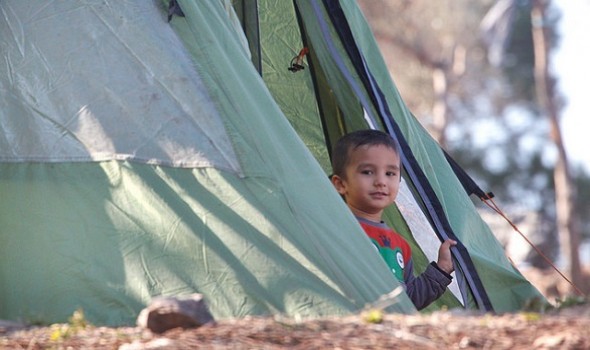Keep families together
Keep families together

Cheers greeted Omar when the Syrian teenager arrived at London’s St Pancras station last week – the 50th child to arrive under a scheme enabling unaccompanied children to join relatives already in Britain.
Fifty! Out of 2.5 million who are living as refugees in neighbouring countries or are on the run in search of safety.
Migrant Voice shares the joy of Omar and his waiting relatives: having travelled across land and sea, he had been held up in Calais for months before getting the final go-ahead.
But we are extremely concerned by this and other delays to the reunion of refugee families. We urge the Government to remove obstacles to family reunion. The protracted delays to which they are subjected puts enormous stress on families and hampers their attempts to build new lives in the UK.
This is a matter of humanity and of law.
Individuals with refugee status or humanitarian protection have a legal right, under UK and international legislation, to apply to bring their immediate family members to join them here.
We are concerned about the number of refugees whose applications for family reunion have been turned down, as well as many of the reasons for refusal.
The high success rate of the appeals made by refugees with whom we have contact suggests that applications are being turned down as a matter of course rather than on merit.
This is clearly illustrated by some of the reasons for refusal. One Syrian refugee told us that his application for reunion was refused because “he was not wearing a tie in his wedding photos and therefore they did not believe it was his wedding day.”
In addition, demands for documentation to support applications are often unreasonable. In many cases, documents were abandoned in the urgency of flight or destroyed along with their homes. Duplicate official documents - often obtained at considerable expense - are frequently not accepted.
Even when people go through the costly and lengthy process of providing DNA evidence to prove family relationships, they are being refused for reasons such as “a gap in communication with the family on social media.” In other words, ‘The Home Office doesn’t believe you because there is no evidence of conversations.’ Many refugees cannot provide evidence of continuous communication because they changed SIM cards in each country during desperate journeys through Europe. None expected that they would be required to prove communication records. Some have resorted to paying for translations of literally thousands of pages of phone and email records.
One caseworker told a refugee who could not provide this communication record: “That’s your problem, not mine.”
Our concerns about the process include:
• refusal of applications on the grounds that evidence is false or inadequate although there is no reason to doubt its validity
• the limited definition of ‘family’
• protracted waits for decisions
• the cost of DNA testing
• lack of legal aid to help people with applications
• risky journeys for relatives in a country where is no British embassy or it is inaccessible and who have to travel to a third country to apply for family reunion
• the time and cost – to both government and refugees – of processing appeals against refusals for reunion that, on the evidence, should have been granted in the first place.
What is at stake is not about large numbers of people or major policy changes: it’s about ending the devastation suffered by a relatively small number of people to whom we have given refuge. They have risked their lives and undertaken horrendous journeys in order to reach safety and make a home in which to bring up their families. They do not understand why they are being refused permission to be reunited with their families. Nor do we.
Splitting families can cause mental and physical illness. And to add injury to insult, the longer the wait before reunion, the harder it becomes for families to function normally after reunion.
Migrant Voice is also concerned that thousands of refugees are given neither “Refugee status” or “Humanitarian protection”: instead they are granted Leave to remain, or Indefinite Leave to Enter or Remain outside the Immigration Rules. But individuals in these categories are refused the right to bring their family to the UK, which would have been possible if they were accorded refugee status or given humanitarian protection.
The tyranny of numbers
Underlying all these issues is the concern that the British government’s policy of driving down net migration puts more focus on numbers than on the rights of families to be together.
Since the implementation of the family migration rules in 2012, the right to family life is no longer seen as universal and your level of rights as a family is linked to your level of income. This policy of requiring the sponsoring partner, including British citizens, to earn a minimum of £18,600 per year in order to be allowed to bring in a partner from abroad disadvantages 46 per cent of the UK pollution and disproportionally disadvantages women, people with a disability, people in rural areas, and other groups.
We need a complete overhaul of the family reunion rules and process, supported by a process that is compassionate, practical and humane and which reflects this country’s pride in treating people fairly.
The Home Office is aware of these concerns. It recently issued new guidelines for processing refugees’ family reunion applications. The guidelines clearly state that caseworkers must be mindful of the difficulties people may face in providing evidence and need to exercise flexibility. We call on them to implement their own rules and to backdate them to include previous applications.


